“I want to be the artist that I want to see in the world”: Phoebe Bridgers on Punisher, baritones and her secret weapon
From the first ringing note of a Danelectro baritone on her new album ‘Punisher’, it’s clear that Phoebe Bridgers has evolved into a songwriter, guitarist and producer of her own. We caught up with the 25-year-old to talk collaborations, clarinets and playing gigs in hazmat suits.

Image: Frank Ockenfels
For those of us who practised social isolation long before it was part of our everyday lexicon, a global pandemic presents a different set of mental hurdles, which Phoebe Bridgers is clearly still trying to get her head around. “It’s all right, y’know?” says the 25-year-old from her Los Angeles home. “I weirdly like days like this, where I don’t have shit to do and can write or whatever. It’s just hard to enjoy it when the circumstances are what they are. It’s just so confusing. Technically I’m having a nice day but then there’s the idea that I couldn’t go outside even if I wanted to.”
You can’t blame Bridgers for enjoying some downtime. Since the release of her debut album Stranger In The Alps in late-2017, the LA native has spent an enormous amount of time on the road, supporting that record and touring with lauded side projects Boygenius (with Julien Baker and Lucy Dacus) and Better Oblivion Community Center (with Conor Oberst). Indeed, if not for the Current Situation, she’d soon be embarking on a massive US tour with The 1975, one that would nicely coincide with the unveiling of her much-anticipated second album Punisher. To be released on schedule, on 19 June, it’s a record that showcases her evolution as a songwriter, artist and producer – just don’t call it experimental.
“I get questions like, ‘How do you feel about such a radical departure?’ and I’m like, ‘What are you talking about?!’” says Phoebe, chuckling at the Punisher feedback she’s received so far. “People will be like, ‘Clearly, it’s very experimental,’ and I’m like, ‘No, I just piled more shit on it!’
“I did go back to the same producers [Tony Berg and Ethan Gruska] and strived to try more shit. But the reason that I went back to those same producers is that I wanted to make something that was at least similar to Stranger In The Alps.”
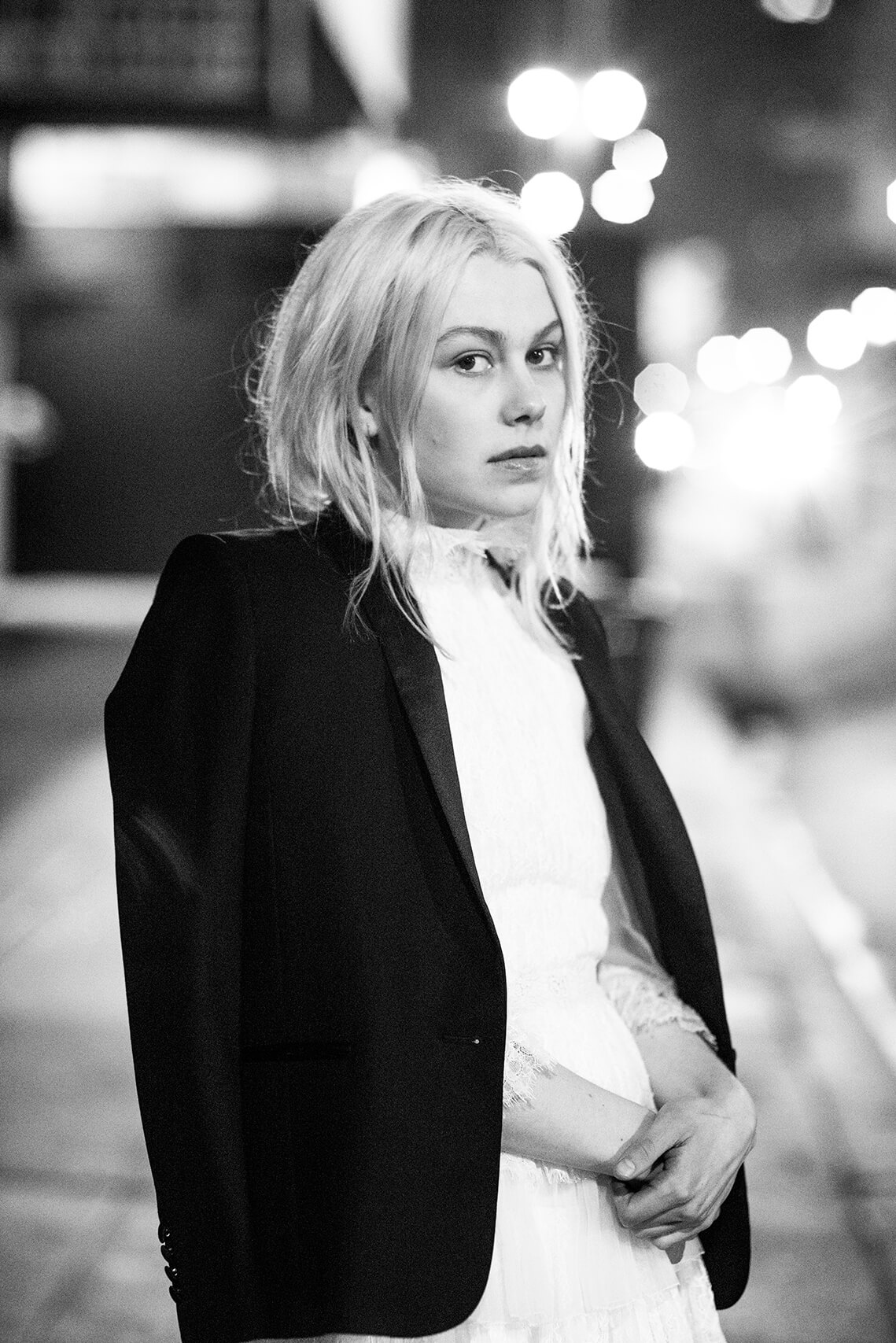
Failing with style
The new album definitely feels like Bridgers 2.0, with the artist maintaining her raw lyrical temperament and knack for pop hooks rather than disappearing down the rabbit hole of radical stylistic departure.
“Every time I try to do experiments, I fail,” she says. “I love bands like Joyce Manor, Jawbreaker, and Guided By Voices, bands that have weird songs that are pretty repetitive and short. Often, I’ll be like, ‘I’m gonna try to write a minute-and-a-half song,’ and then four minutes later, I’m like, ‘Alright, whatever. At least I wrote something!’”
But that’s not to say that experimentation wasn’t the order of the day during Punisher’s long gestation, more that it’s been a fundamental part of how she makes her records since Stranger In The Alps.
“I think of myself more as a producer than a musician,” says Bridgers. “My favourite thing to do is write 15 versions of the same song and then fuck them up in the studio, because if I try to make the song into something interesting just on guitar, I get so wrapped up in it that I give up. I’ll be like, ‘Oh, whatever – that just sounds like this other thing’.
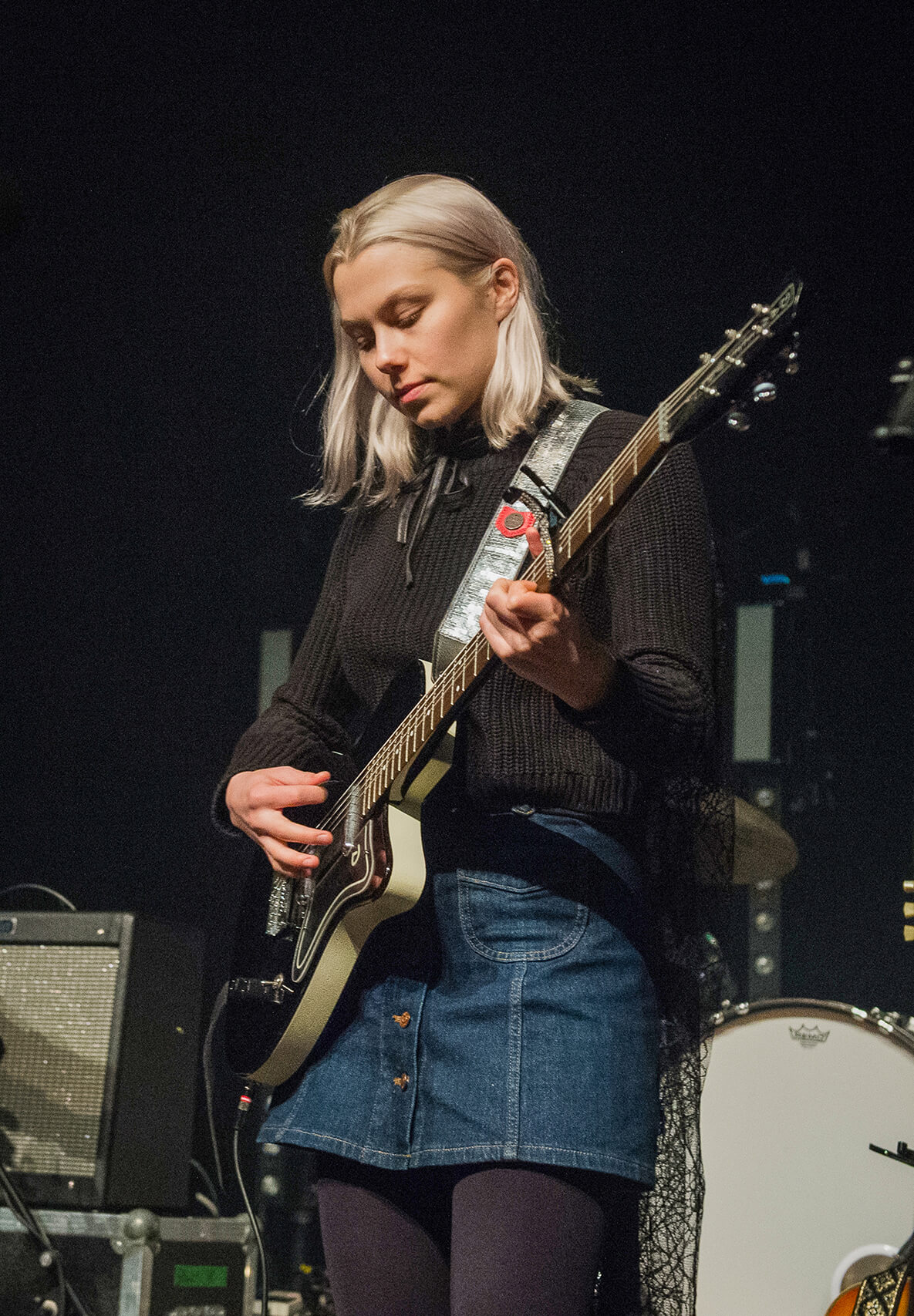
“I’ll never let myself plagiarise or do something that sounds exactly like something else, so I guess I just trust in that process. And for that reason, I take longer than most people to make stuff, because I’ll write a song and then six months later, it’s super-different. The song Kyoto was a fucking ballad! I just like writing stuff and then fucking it up.”
Second-album syndrome may be a well-worn trope but the ramped-up expectations that follow immeasurably successful debuts have been too much for many artists. But it’s not something that phased Bridgers during the creation of Punisher.
“It’s something that everyone who writes faces at some point,” she says, with a shrug. “You’re basically writing for yourself – and then you have an audience. I don’t think it’s changed me much but it’s changed the record. I feel like the experiences catalogued on the first record are those of a teenager or someone in their early-twenties with no job. I don’t typically write about other people’s experiences. I only really find it in myself to write about my own life. So it’s changed in that way, because I’m now writing about my new life.”
Touched by genius
It’s hard to imagine how Bridgers has found the time to record and write any music over the past three years given her commitments to Lucy Dacus, Julien Baker, Conor Oberst, Matt Berninger and The 1975 – a full dance card by anyone’s standards. Collaboration is clearly something that energises and inspires her, and it exposes her to things that aren’t necessarily in her comfort zone.
“I like to write with my friends,” says Bridgers. “I write with Conor all the time. I write with my drummer Marshall. I need people to bounce stuff off. When I collaborate with other people and things aren’t up to me, decisions get made more immediately. When it’s my decision, I’ll be like, ‘Oh, I’ll think about that later’. But when you’re making a record with someone else, you have to figure shit out!
“A lot of the Better Oblivion stuff was recorded live, most of the Boygenius material was recorded live or with light overdubs – it’s just a totally different experience. That definitely changed the way that I think about making records, which is very overdub-based. You get a click track, and a vocal and then turn it into something.”
Of all the enriching collaborations Bridgers has done, however, it’s the Boygenius EP and tour with Baker and Dacus that stands out to her – a special moment in time that she appreciates even more in retrospect.
“I feel like that was the high point of my life, especially right now,” she says. “I was still excited about playing bigger rooms than I’d played before, and at the end of the night, I would go out on stage with all my friends. Now I’m just chasing the dragon to get back there – I hope to have more experiences like that. It was just so fun. I’ve never had an experience that felt more like summer camp. I love that people like it, because it was really important to us.”
“I like to write with my friends. It’s fun to be surrounded by people who I can just be comfortable with”
The more Bridgers talks about collaboration, the more evident it is that it’s fundamental to how she wants to write and record music, whether it’s her solo material or something with others.
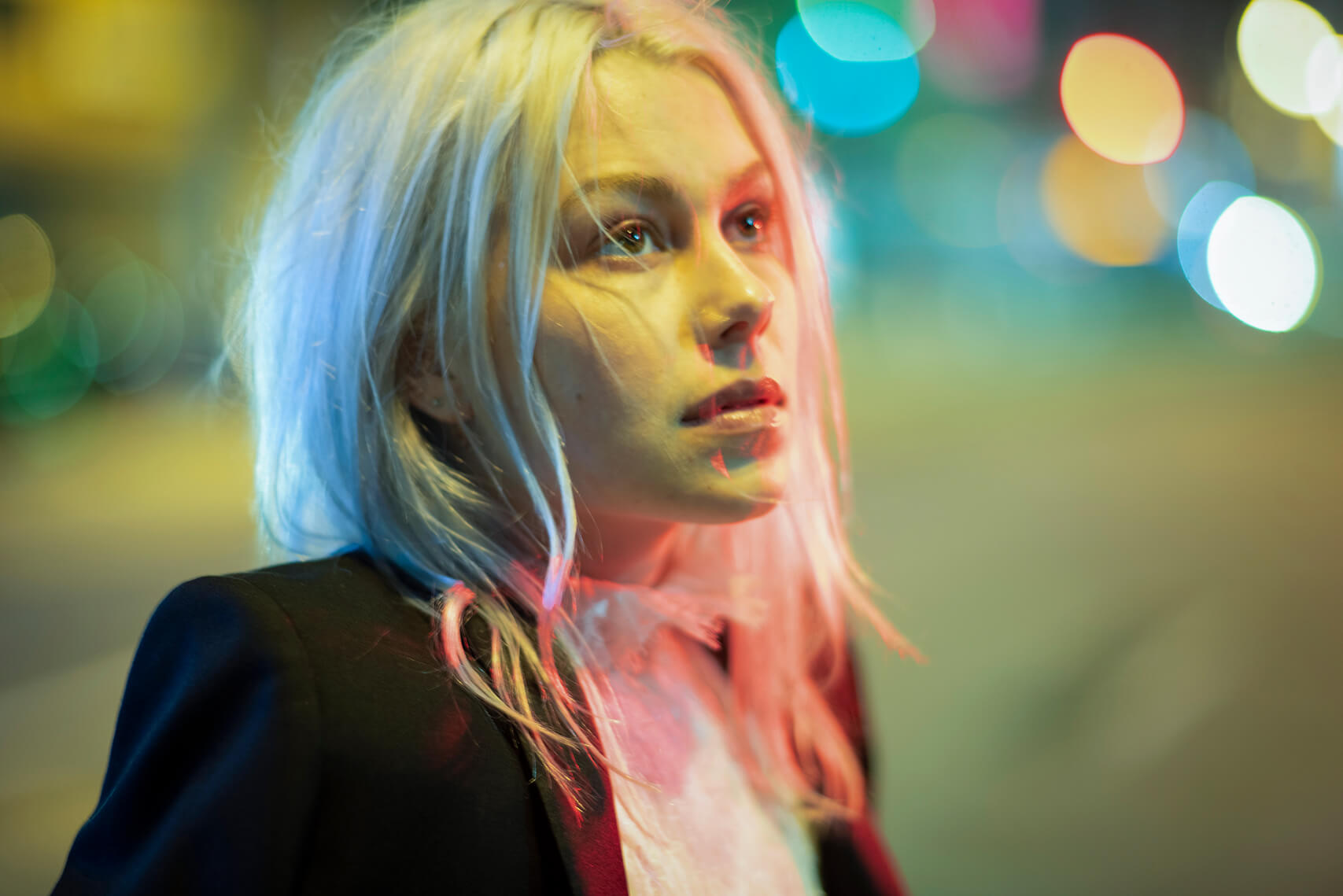
“It’s fun to be surrounded by people who I can just be comfortable with,” she says. “If I have a be-all and end-all opinion about something, it’s my music, whereas Connor and I would get into arguments and, if we were collaborating, we’d just work it out. If it’s my own music, I look to other people for help and then ignore it if I don’t like it – and that’s no way to be in a band.”
Better together
When it came to writing Punisher, Bridgers turned to Oberst, her drummer Marshall Vore, and longtime collaborator Christian Lee Huston (whose latest solo album Northsiders she produced). These are her most-trusted collaborators, and they allowed her to skip any pretence in the pursuit of making the record she wanted.
“If Marshall has a bad idea, I’m like, ‘Dude, that’s a bad idea,’” she says, with a laugh. “But if I’m writing with someone I don’t fully trust, I’ll be like, ‘Oh my god, that’s so great,’ and then ignore everything they said.”

Returning producer duo Berg and Gruska were also a key part of Phoebe’s vision, just as they were with Stranger In The Alps.
“They’re amazing people for one but the main thing that makes us really good collaborators is that we have different skill sets,” says Bridgers. “Ethan has a deep knowledge of synthesizers and is a keyboard virtuoso but can also edit stuff for hours and doesn’t get tired. Tony has worked on some legendary records, is a crazy-good guitar player and has a lot of weird and creative ideas, as well as a collection of absurd instruments. It’s cool because I’ll never be like that, so I need others to be like that around me.”
Phoebe cites everything from Billie Eilish (“her production is so cool”) to Guided By Voices, Caroline Polachek, Mitski, and Big Thief as influences on Punisher. But another key facet that makes it feel resolutely like a Phoebe Bridgers record is the wonderfully esoteric and original contributions of her guitarist Harrison Whitford.
“He’s like a secret weapon,” she says. “Harry and I have been friends since we were 19. He started playing guitar with me and we tried to make a bunch of terrible music together until we met Tony. Since then, Harry has turned into the most important through-line of my records – the guitar on both sounds like him.
“It’s funny. He used to be a little shreddy NAMM guy,” she adds, laughing. “But now he’s one of the only people I feel comfortable leaving alone in the studio because I trust him so much. He’ll play 15 things and then the 16th thing will be the hook of the song – and then you’ll have to go back and retrack everything.
“When I do a solo thing and when I’m doing Better Oblivion, I miss his playing so much, because it’s just a style. It’s different to someone who learns parts – which is amazing as well, and I value that on almost every other instrument – but his guitar playing has been something that I have leaned on for my whole career.”

This gives us the impression that a Phoebe Bridgers recording session is far, far from a ‘get in, play the parts and get out’ scenario, and something altogether more experimental and free.
“Recording is like writing to me,” she says. “For the most part, if I’m not sure what direction I want to take something, my method is to track everything and decide later. It’s chaos. It takes forever. Sometimes we’ll track a whole song and then retrack it six months later because, the first time around, we were basically writing it and deciding what parts we liked. Later, we delete everything and start from scratch.”
“There’s something about the key of my danelectro, it manages to make everything sound darker and less Americana”
As workflows go, it’s not what you’d call efficient, but it’s led to some spectacular results – and in the case of one of the album’s guest performers, results that surprised even Bridgers.
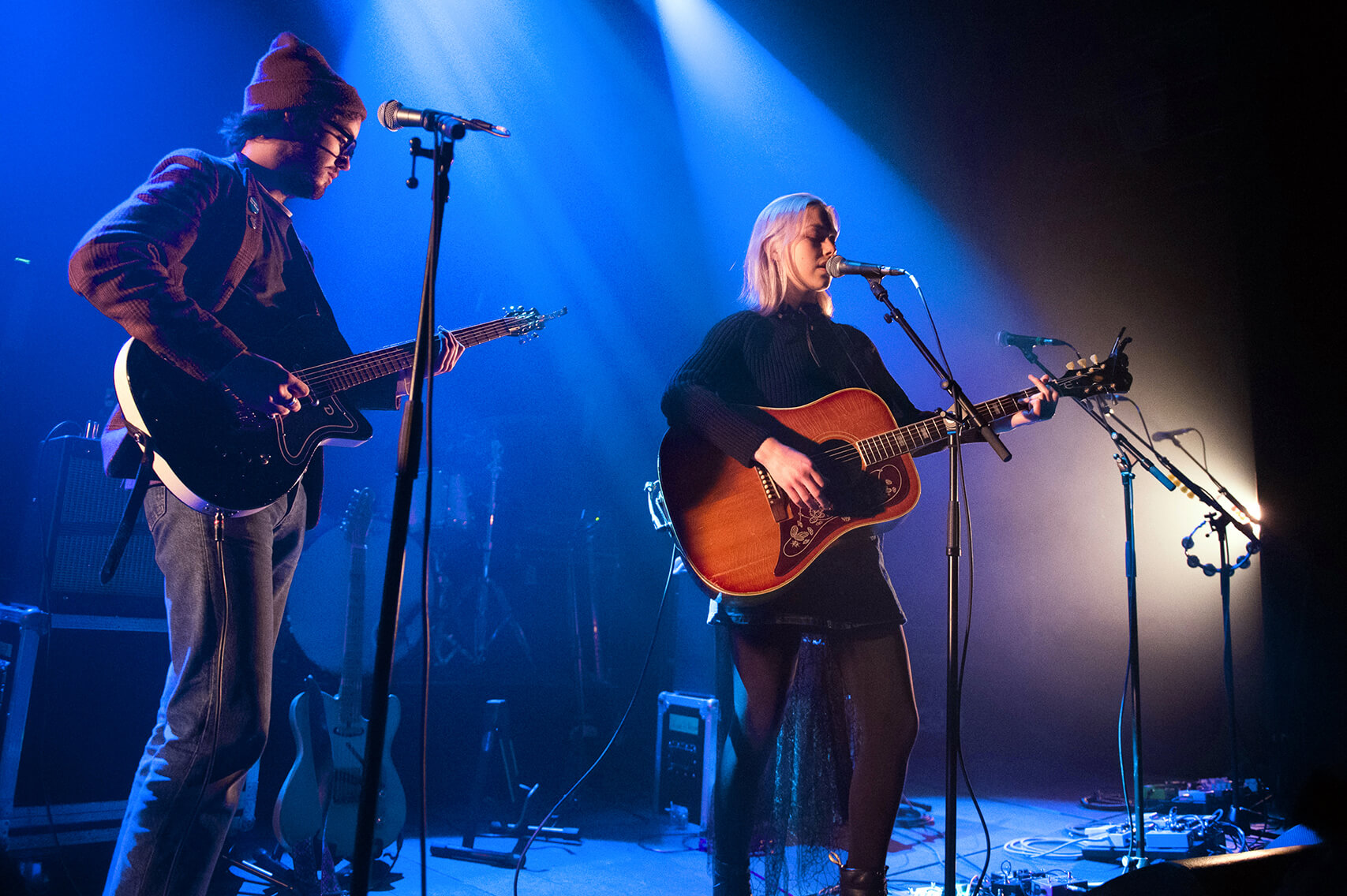
“Blake Mills plays clarinet on Savior Complex,” she says. “Blake was like, ‘Hey, I play clarinet,’ and I was like, ‘Please, don’t…’ But he did it – and it’s the best! I also love his guitar playing on Halloween, and he was also going to come in and play some random percussion on some stuff and ended up playing drums on Halloween too. They’re some of my favourite drums on the record, and I was actually pretty set on not having drums on that song. I love moments like that.”
Bari tones
It’s not much of a stretch to say that, from the moment Bridgers’ strapped on a Danelectro baritone during the Strangers In The Alps sessions and promptly fell in love, she’s single-handedly made baritone guitars cool again, particularly in the alternative sphere.
Given that the instrument has become such a sonic hallmark of her various side projects since, it’s no surprise that the Dano has replaced a battered old nylon-string as her writing implement. “I have it plugged in at my house,” she says. “I don’t even use a pedalboard, because it’s kind of hard on pedals. I just plug it into my amp and write. There’s something about the key of it, it makes everything darker and less Americana. I can write a folk song on it and it sounds nothing like a folk song. If I’m covering a song and want it to sound like my version, all I have to do is plug in a baritone.
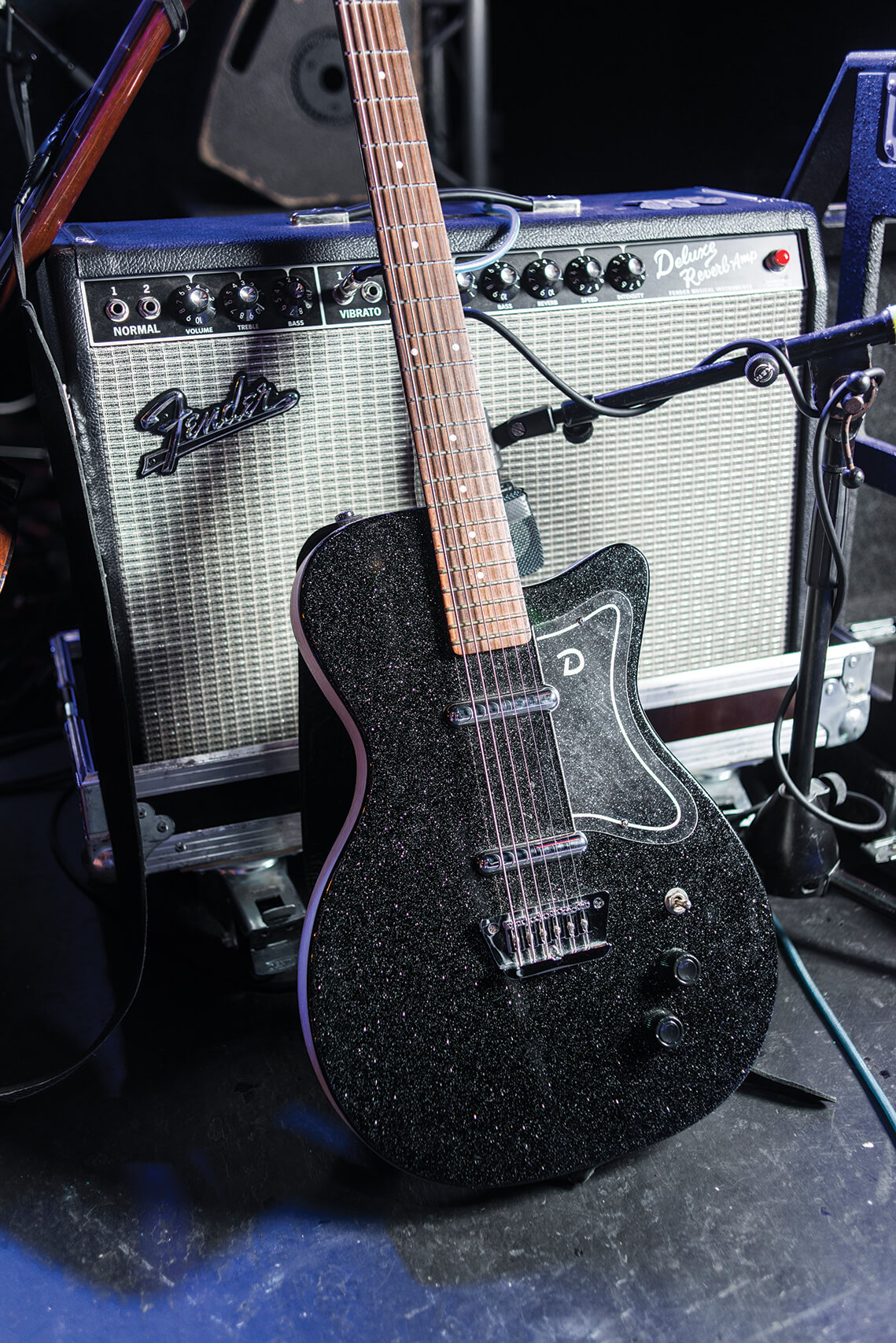
“For want of a better term, it just feels more like tape to me. It feels like you’re listening to something that’s been run off a tape rather than a fucking output at a studio. It feels raw, almost to the point that it’s wrong. But I just love how dark it sounds.
Given that Bridgers’ 2015 debut EP Killer features just her voice and an acoustic guitar, it’s striking to note how little acoustic there is on Punisher, with its only prominent appearance occurring on penultimate track Graceland Too. Has she fallen out of love with flat-tops?
“It’s chaos. Sometimes we’ll track a whole song, then retrack it six months later because, the first time around, we were writing it. Later, we delete everything and start from scratch”
“Hilariously, I actually feel the opposite,” she says, with a laugh. “I’m always like, ‘Damn, I should just play acoustic’. Graceland Too was one of the last songs I recorded, and it was me being like, ‘Goddammit, I just love acoustic guitar so much’. I get so excited in the studio. But towards the end of the record, I just wanted some regular fucking acoustic guitar! Then we were halfway through the song and we were like, ‘What if we plugged it into the iPad?!’ I can’t just keep things simple.
“I always want to be able to make something different and to feel challenged. I’m trying and failing to learn piano right now, and anytime I even learn a new chord, it’ll spawn five songs in me. I’m just trying to do more shit like that. Maybe the next record will be all acoustic, and maybe the record after that will have no acoustic. I love experimenting, which is weird because I’m terrified of change!”
Pressing onwards
At the moment, the music press feels like an endless parade of cancelled tours and deferred albums, and it’s having an impact on artists just as much as fans. Bridgers should be gearing up for a huge US arena tour with The 1975 but, like the rest of us, she’s instead trying to make the best of the little she’s been left with.
“I had so many plans that are just gone,” she says, forlornly. “What’s so terrifying and exciting right now is that anything could change. If you told me that, a year from now, I’ll start a completely different band and play underground punk shows to people in hazmat suits, I’d believe you. If you told me that music festivals will exist again and I’ll be playing them, I would also be stoked. I feel pretty open.”

One thing she can be sure about, however, is Punisher’s release date. At a time when so many artists are putting new releases on hold until they can tour them, Phoebe’s take on the issue is honest and affirming.
“I was going back and forth about it,” she says. “I feel like I should just press on because that was the plan. I just want to keep myself sane, keep making shit. Because, you know, if for some reason touring it isn’t realistic, what will my life turn into? I’ll still want to make records. I’m just trying to keep a level head. I want to be the artist that I want to see in the world – and I want to put the album out because I want people to still get their music out there.”
Punisher is out 19 June on Dead Oceans.
